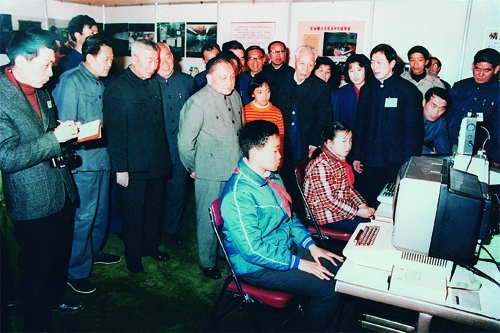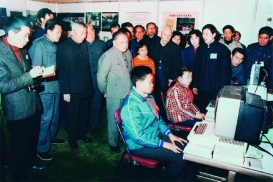At the MPIWG, Bo An is working on his dissertation, an interdisciplinary history of computation and modeling in the People's Republic of China over the latter half of the twentieth century, from the 1940s to the 1990s. It covers a diverse group of topics including cybernetics, applied mathematics, machine translation, computer education, statistics computing centers, AI, and techno-cultural fevers. Bo An hopes to provide a broad picture of the impact of computing in modern China that can help to understand the mutual shaping of computing and modern Chinese history, and offer a perspective to understand the development and consequences of both in interaction.

Deng Xiaoping at Shanghai Microelectronics Exhibition on 16 February 1984, watching national youth programming contest winners Cong Lin (right) and Li Jin (left) operating two Apple II computers connected to Chinese made TV sets. Source: China Welfare Institute Children's Palace Search Results 中国福利会少年宫.
A central working hypothesis—widely held but rarely investigated—is that modern computing has significantly changed Chinese governance, society, and culture. Bo An argues that, in order to understand and evaluate the changes, one not only needs to look at the shaping role of capitalized “Technology” and its own transformation, but also examines the specific technical aspects hidden in plain sight. Treating computing techniques and devices as important agents of change his therefore project has two aims: first, to offer a technoscientific history of Modern China in dialog with those written from political, social, cultural, and intellectual perspectives; and, second, to explore a transnational computing history situated in a non-West context.

